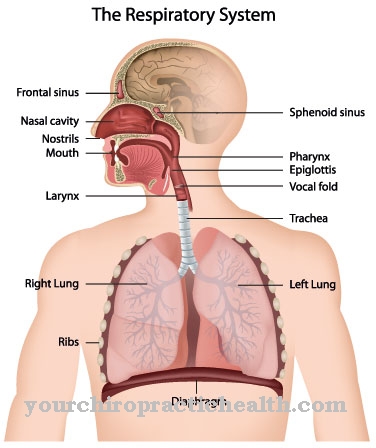As lethargy In medicine, a condition is described in which the person affected is extremely tired and has a greatly increased stimulus threshold. In everyday life, people who appear lazy or tired over the long term are also referred to as lethargic. The medically relevant form is a disturbance of consciousness.
What is lethargy?

© Akin Ozcan - stock.adobe.com
Lethargy essentially consists of severe tiredness in the person concerned and an increased stimulus threshold. Lethargic people react more slowly (sometimes not at all) to stimuli from their environment. This affects the reaction behavior, the communication behavior and their activities.
They're harder to wake up. In addition, those affected do not manage to achieve a normal state of wakefulness for several hours. Rather, they remain in a state of consciousness that can appear as a symptom of various ailments. Lethargy is not an independent illness, but always a symptom of another ailment.
causes
Lethargy is caused by a wide range of diseases and conditions, which mainly affect the brain. Lethargy is a main symptom of European sleeping sickness (a form of encephalitis that rarely occurs).
All diseases or conditions that lead to increased intracranial pressure can also trigger lethargy. To be mentioned here are primarily masses in the brain (tumors and edema) and extreme high blood pressure. Metabolic diseases and diseases that change the blood count can also be the cause of increased intracranial pressure. Heart failure can also cause changes in pressure in the brain.
Furthermore, mental states can also lead to lethargy. For example, it is one of the most common symptoms of depression. Sleep deprivation, breathing problems while sleeping, alcoholism, cardiac arrhythmias, and drugs with sedating effects can also lead to lethargy. Lethargy as a disturbance of consciousness is referred to as tiring and increases the stimulus threshold.
When looking at states of fatigue (due to sleep deprivation), however, people are sometimes also referred to as lethargic who are very tired but have a greatly reduced stimulus threshold. These people are easily irritable and are still considered lethargic on some considerations.
The colloquial meanings of lethargic and lethargy should be left out at this point.
You can find your medication here
➔ Medicines against tiredness and weaknessSymptoms, ailments & signs
Lethargy is mainly characterized by the fact that those affected have a greatly increased need for sleep. This is also available during the day and sometimes forces people to rest.
However, most lethargic people do not manage to enter the deep sleep phase and cannot recover despite sleep. As a result, those affected become sluggish in their entire behavior. They miss details. Spoken words and calls to action often miss them. Sleep states often seem to be initiated without a specific trigger. Lethargic people are also more difficult to wake up, but still don't sleep deeply or well.
Lethargic people can appear indifferent in different ways. The transition to apathy is accordingly fluid and difficult to define. People are unable to concentrate. The blood pressure may be increased. The eyes can become oversensitive.
A form of lethargy that is primarily triggered by sleep problems, on the other hand, greatly reduces the irritation threshold, whereby the person concerned will mainly complain of fatigue. However, contrary to real lethargy, this state is temporary and usually disappears the next time you sleep in. These lethargic people are often very irritable and have an increased need to withdraw.
Lethargy usually develops as a condition over time. Depending on the cause, this is then organic or psychological. At a certain point, the body is so overloaded that the person becomes lethargic. Early signs of lethargy are tiredness despite the feeling that you have slept enough, as well as increased inattention.
Complications
Lethargy as a condition itself means complications for the personal life of the person concerned. Lethargic people are not productive enough. Social isolation can occur and is often due to increasing indifference. In addition, the greater the tiredness, the greater the accident risk. Lethargy as a disturbance of consciousness knows no real increases. Rather, it has an indirect effect through possible complications.
Overall, however, the causes of the lethargy are more decisive for considering possible complications. In the worst case scenario, untreated depression can lead to self-harming and suicidal behavior. Brain tumors and other damage to brain tissue are often associated with a high mortality rate. Heart damage and nocturnal breathing problems can be the harbingers of severe and chronic ailments. Alcoholism as a cause can ultimately be fatal.
Another problem with the combination of depression and lethargy is that depression often goes untreated for a long time and lethargy often appears very early. In addition, feelings of guilt that arise due to failure to perform (but expected) increase depression. The losses that lethargic people suffer due to their social and general performance can therefore occur very early on.
In general, the risk of complications affecting the personal life of the lethargic person increases with the duration of a lack of treatment. The same applies to complications that are caused by the triggers of the lethargy.
When should you go to the doctor?
Lethargy that seems unfounded and lasts for more than a few days is always a reason to see a doctor. The person affected will notice a strong and inexplicable tiredness. Accordingly, symptoms of lethargy after a bad night are no reason to see a doctor.
First attempts can take place at the family doctor. Depending on what the cause research reveals, it must then be forwarded to a specialist. For example, cardiologists, neurologists and doctors with a psychiatric orientation come into question.
diagnosis
A doctor usually determines whether a person is lethargic through an anamnesis. It is important to find out whether the condition can be explained by living conditions or whether it has a disease value. If the second is found, various causes must be considered.
For this, the mental and physical health of the patient is considered. An examination of the brain using imaging methods is usually the end of the search for the causes of the lethargy. Occasionally it happens that a clear diagnosis cannot be made. Then a psychological cause is usually assumed and acted accordingly.
In addition, other ailments and conditions with similar symptoms must be excluded for an accurate diagnosis. These include, for example, somnolence or drowsiness as a result of an accident.
Treatment & Therapy
The treatment of lethargy is, if the triggers are organic and known, ideally causal. This means that any triggers of the lethargy that can be attached to the heart or brain, for example, are treated. Because of the amount of ailments involved here, there are many treatments. They can be medicinal and surgical.
Brain tumors and brain edema often make complicated interventions in and on the brain necessary. If a heart failure is the cause, therapy usually consists of medication and a changed lifestyle. Increased intracranial pressure must be considered in each individual case.
If, on the other hand, psychological triggers of lethargy are known or suspected, various psychotropic drugs are used. Most of the time it is a question of drugs that are supposed to have a stimulating and motivating effect. In the case of depression, antidepressants (usually SSRI reuptake inhibitors) are prescribed by default, which at the same time have a positive effect on lethargy.
Otherwise, the lethargy can also be treated with methylphenidate and other psychostimulants. Depression also requires other treatment methods, such as talk therapy or the formulation and achievement of new goals.
If the patient's sleep is the main problem, methods from the field of sleep hygiene are used to try to make better sleep possible. This means that the patient's sleep is analyzed and he is then shown ways to improve his sleep. This can affect sleeping equipment, lighting and much more.
You can find your medication here
➔ Medicines against tiredness and weaknessOutlook & forecast
The prognosis for lethargy depends on the underlying disease. It is not an independent disease that gives a prospect of the further course of the disease. Rather, severe tiredness and poor physical and mental performance are symptoms. It is therefore imperative to clarify and eliminate the cause in order to be able to provide further assessments.
In most cases, the patients suffer from an underlying mental illness. They include depression or burnout. The disorders are characterized by a usually protracted course of the disease. Still, there is a prospect of a cure. If the disease is chronic, the overall prognosis is usually poor. Often the existing state of health is maintained over a long period of time or deteriorates continuously. If the person concerned is able to recover from the main illness in cooperation with a therapist and his / her own collaboration, the symptoms of lethargy are usually also alleviated.
If there are physical disorders, medication is usually required to improve health. Long-term treatment comes about, most of which are irreparable disorders of the heart, circulation or metabolism. A good prognosis is rarely possible without medical help. The diseases that symptomatically lead to lethargy are too extensive and complex.
prevention
As different as the causes of lethargy are, so are the measures taken to prevent it. The heart and brain, for example, can be well protected by an overall healthy lifestyle. However, the risk of developing a brain tumor, for example, cannot be completely avoided.
However, everyone can turn off risk factors. Depression can only be prevented to a limited extent. In theory, you can hit anyone and people are differently prone to it. However, there are indications that the risk of depression can be reduced by an adequate amount of serotonin and dopamine. Both are linked to the day-night rhythm and sufficient supply of sunlight. Accordingly, healthy and regular sleep and enough daytime activities can be beneficial.
Preventing problems falling asleep and staying asleep is also a way of preventing lethargy. This looks different for every person. For example, some people sleep better if they have their last meal a few hours beforehand, and others sleep better if they do light exercise before going to sleep. Everyone has to find out for themselves what has a beneficial effect on their own sleep.
Aftercare
In most cases, those affected with this disease do not have any follow-up measures available. The disease itself must first and foremost be examined and treated directly by a doctor so that there are no further complications that could make everyday life difficult for the person affected. The affected person should consult a doctor at the first signs of this disease so that it can be treated quickly.
If the disease is left untreated, it can lead to serious complications that significantly reduce the person's quality of life. In most cases, lethargy patients need treatment from a psychologist. The treatment should be carried out regularly in order to properly relieve the symptoms. Contact with other patients with the same illness can also be useful, as this leads to an exchange of information. Typically, this disease does not reduce life expectancy.
You can do that yourself
The possibilities for self-help in the event of lethargy largely coincide with the self-help measures that are also recommended for the underlying diseases.
Furthermore, lethargic episodes can be cushioned through planned rest and sleep breaks, which are ideally integrated into everyday life. The generally motivated and powerless mood, on the other hand, can hardly be overcome without outside help. It is not advisable to resort to supposedly stimulating drugs.
If the person concerned has learned relaxation methods, such as autogenic training, they can also use them. Since most lethargy sufferers cannot enter the deep sleep phase, more sleep is not a sensible option for self-help. Overall, the possibilities for self-help to counteract the cause of the lethargy are limited.



.jpg)
.jpg)






















